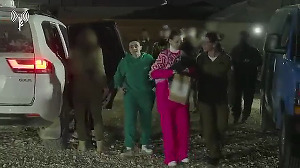Tucked away above Platform 4 at the noisy Grant Road railway station in south Mumbai is the office of the Western Railway Employees Union. These couple of rooms -- housing a clutch of desks that rumble when suburban trains leave the station below, located up a tall flight of stairs -- handle issues, grievances and rights of the 95,000 employees who belong to this union.
The pace at this office is quite different today.
The staff is working on tasks they have probably never had to confront before. Union treasurer J R Bhosale cannot recall a catastrophe of this dimension. "In my 45 years with the Railways I cannot remember an incident like this," he says.
The Western Railway lost 19 employees in Tuesday's seven blasts, he says. About 40 employees are injured. Bhosale and his colleagues have been working on the difficult task of discovering who is missing, who is dead and who is injured. Union officials walk about with sheafs of papers as lists are compiled and figures totalled.
The injured have to be located. The union then checks if the employee is receiving adequate medical treatment and if he is in a position to be transferred to the railway hospital.
Most of the employees have been admitted to either the Karuna Hospital located between Borivali and Dahisar in northwest Mumbai or to the Jagjivan Ram Railway Hospital at Agripada near Bombay Central. A few stray cases are admitted at the KEM Hospital at Parel, central Mumbai. On Thursday morning Bhosale visited the injured employees at the railway hospital.
More difficult is being able to put a fix on the deaths. Till Thursday afternoon the figure stood at 17 dead. But by 4 pm two missing employees were confirmed dead. "We discovered the body of one of our employees at KEM."
Dead employees held a variety of positions -- some were estimators, some were senior clerks, some were overhead line specialists and four worked as engineers in the electrical branch.
"I didn't know them personally. But I knew they were good people. Good employees. Like Suresh Chand, who was working after retirement as GM (general manager) at RITES (a railway consultancy service). Or S R Meena who worked in the control room (track movement). But I guess Bhagwan us se jyada pyar karte (god loved them more)."
Ten deaths alone were reported from the Western Railway headquarters in Churchgate. Outside the lift at the headquarters a white board offers condolences. Smita Rosario, senior public relations inspector, Western Railway says the deaths stand at 15 deaths and 33 injured.
"I knew one of them," she says quietly. "I used to work with him before I came to this department. He was a very jovial, outgoing and very extroverted. I heard about his death yesterday morning."
Was there any reason for so many railway employee deaths?
Says Bhosale, "A majority of the deaths were on the train that had a blast at Mira-Bhayander. The employees who died were on multiple trains and it was not as if all of them were travelling together. It is just that the timing was such. It coincided with the time of the trains many of the employees of the divisional railway headquarters took when their duty ended."
Bhosale cannot remember a situation anywhere, or at any time, when the Indian Railways faced so many deaths in one mishap.
The Northeast Frontier Railway, whose network spreads across Assam, he says periodically fends off bombs and abductions/killings of its employees and those figures compounded are high but that is over a period of time.
Never on one day.
Says Rosario, "According to what the railway minister announced jobs will be given to the next of kin."
Bhosale says in addition each family will get Rs 500,000 (Rs 5 lakhs) as compensation. The next of kin will get jobs appropriate to their educational qualifications possibly as telephone operators or clerks.
He does not feel finding opportunities for these relatives will be tough. "The deaths were mainly in higher middle-class homes. There is no chance than anyone is illiterate in these homes. Even the housewife will be a graduate."
Bhosale then proudly tells you that the work done by Western Railway employees after the blasts was in line with the indomitable spirit of Mumbai.
"So many motorman, guards, station masters were on duty continuously for 24 hours after that, until they could be relieved. The employees had repaired the damaged rakes and normalised services just six hours after the blasts. Employees went out of their way to organise white bed sheets for the dead and offer accommodation to passengers who could not reach home."





 © 2025
© 2025